Related Research Articles

The King James Version (KJV), also the King James Bible (KJB) and the Authorized Version, is an English translation of the Christian Bible for the Church of England, which was commissioned in 1604 and published in 1611, by sponsorship of King James VI and I. The 80 books of the King James Version include 39 books of the Old Testament, an intertestamental section containing 14 books of what Protestants consider the Apocrypha, and the 27 books of the New Testament. Noted for its "majesty of style", the King James Version has been described as one of the most important books in English culture and a driving force in the shaping of the English-speaking world.

William Bradford was an early American colonial printer and publisher in British America. Bradford is best known for establishing the first printing press in the Middle colonies of the Thirteen Colonies, founding the first press in Pennsylvania in 1685 and the first press in New York in 1693. Bradford operated continuously printing establishments for sixty-two years, heading a family that would include printers and publishers for 140 years. He was also known for controversies regarding freedom of the press. Starting his printing career in London, Bradford emigrated to America in 1685. He established, with others, the first paper mill to appear in the Thirteen American Colonies.
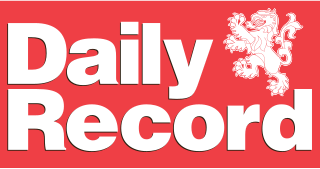
The Daily Record is a national tabloid newspaper and news website based in Glasgow, Scotland.
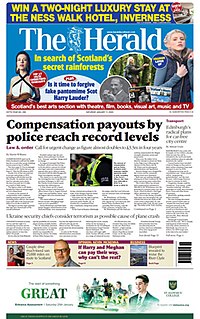
The Herald is a Scottish broadsheet newspaper founded in 1783. The Herald is the longest running national newspaper in the world and is the eighth oldest daily paper in the world. The title was simplified from The Glasgow Herald in 1992. Following the closure of the Sunday Herald, the Herald on Sunday was launched as a Sunday edition on 9 September 2018.
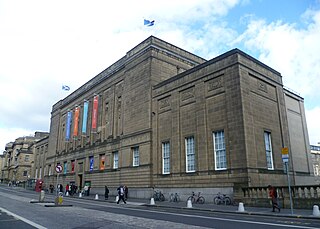
The National Library of Scotland (NLS) is the legal deposit library of Scotland and is one of the country's National Collections. As one of the largest libraries in the United Kingdom, it is a member of Research Libraries UK (RLUK) and the Consortium of European Research Libraries (CERL).

A chapbook is a small publication of up to about 40 pages, sometimes bound with a saddle stitch.
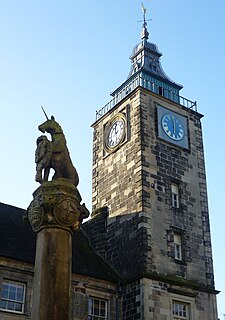
The Radical War, also known as the Scottish Insurrection of 1820, was a week of strikes and unrest in Scotland, a culmination of Radical demands for reform in the United Kingdom of Great Britain and Ireland which had become prominent in the early years of the French Revolution, but had then been repressed during the long Napoleonic Wars.
The Scottish Daily News (SDN) was a left-of-centre daily newspaper published in Glasgow between 5 May and 8 November 1975. It was hailed as Britain's first worker-controlled, mass-circulation daily, formed as a workers' cooperative by 500 of the 1,846 journalists, photographers, engineers, and print workers who were made redundant in April 1974 by Beaverbrook Newspapers when the Scottish Daily Express closed its printing operations in Scotland and moved to Manchester.
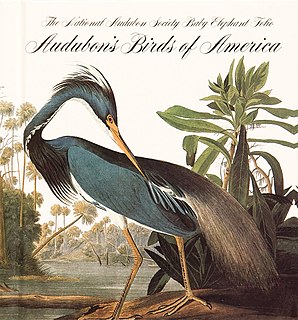
The Birds of America is a book by naturalist and painter John James Audubon, containing illustrations of a wide variety of birds of the United States. It was first published as a series in sections between 1827 and 1838, in Edinburgh and London. Not all of the specimens illustrated in the work were collected by Audubon himself; some were sent to him by John Kirk Townsend, who had collected them on Nathaniel Jarvis Wyeth's 1834 expedition with Thomas Nuttall.
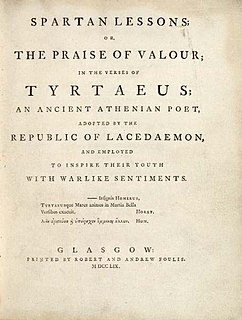
Robert Foulis was a Scottish printer and publisher.
Robert McLellan OBE (1907–1985) was a Scottish renaissance dramatist, writer and poet and a leading figure in the twentieth century movement to recover Scotland’s distinctive theatrical traditions. He found popular success with plays and stories written in his native Scots tongue and is regarded, alongside William Lorimer, as one of the most important modern exponents of fine prose in the language.

The New-England Courant, one of the first American newspapers, was founded in Boston in 1721, by James Franklin. It was a weekly newspaper and the third to appear in Boston. Unlike other newspapers, it offered a more critical account about the British colonial government and other figures of authority. It published critical commentary about smallpox inoculation which fueled the controversy during the 1721 small-pox epidemic in Boston. Ultimately it was suppressed in 1726 by British colonial authorities for printing what they considered seditious articles. Franklin took on his brother, Benjamin Franklin, as an apprentice and at one point was compelled to sign over publication of the Courant to him to avert further prosecution. Benjamin submitted anonymous editorials to the Courant, which resulted in James' imprisonment after he began publishing them.This sort of Governmental censorship of early colonial newspapers is what largely fostered the American ideal of Freedom of Speech in the press. The New England Courant is widely noted among historians as being the first newspaper to publish Benjamin's writings.
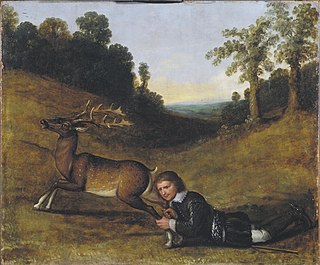
Alexander Shields or Sheilds or Sheills was a Scottish, Presbyterian, nonconformist minister, activist, and author. He was imprisoned in London, in Edinburgh and on the Bass Rock for holding private worship services. After his escape from prison he wrote A Hind Let Loose which amongst other things argues for the rights of people to resist tyrants including the bearing of arms and the resistance of taxes. It even argues that assassination, in extreme cases, is sometimes justified. Shields was one of the ministers who supported the Cameronians who disowned the king. They were brutally put down. All three of the Cameronian field-preachers, of which Shields was one, rejoined the church after the Revolution. Shields served as a chaplain to King William's armies in the Low Countries. Shields was later called to be a minister at St Andrews but did not stay there long as he joined the second Darien Expedition. After its failure he died on Jamaica under 40 years of age.
John Baskett (1664/5–1742), was the King's Printer for England. His sons, Thomas and Robert, and grandson by the latter, Mark, were also engaged in the press. By purchasing reversion of the King's Printer position, Baskett kept it in the family for the following generation.
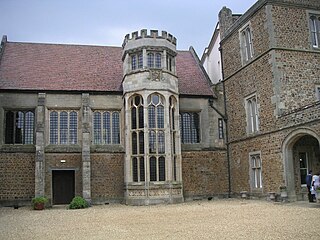
Robert Waldegrave or Walgrave, the son of Richard Waldegrave of Blockley, Worcestershire, was a 16th-century printer and publisher in England and Scotland. From 1578 to 1588 he printed numerous, mainly religious works in London, and from 1590 to 1603, more than 100 books in Scotland. In 1603, following King James I of England's accession to the English throne, he returned to England, but died later the same year.
James Watson was a Scottish printer, bookseller and founder of several Scottish newspapers, coming from a long line of printers. Unafraid of controversy in his printing he was in court multiple times and imprisoned at least once.
William Veitch. He was the youngest son of John Veitch, the minister of Roberton, Lanarkshire. He was educated at the University of Glasgow, graduating with an M.A. in 1659. He became a tutor in the family of Sir Andrew Ker of Greenhead. He was licensed to preach by the Presbytery of Lanark in 1664. Having identified himself with the Pentland Rising, he was outlawed, and escaped to Newcastle, where he became chaplain in the family of the Mayor. In 1671 he was ordained to a meeting-house at Fallowlees, a remote spot among the Simonside Hills, Rothbury. From that he removed to Hanamhall, in the same district, and afterwards to Seaton Hall, Longhorsly. Whilst living at the latter place under the assumed name of William [or George] Johnston, he was arrested on 16 January, and sentenced to the Bass Rock 22 February 1679.. Veitch was liberated on 17 July 1680, and returned to Newcastle. He aided Archibald, Earl of Argyll, in his escape from Scotland in 1681. In 1683 he went to Holland, and in 1685 he was again in Northumberland acting as an agent on behalf of Monmouth. Soon afterwards he was settled as minister of a meeting-house at Beverley, Yorkshire. Having returned to Scotland, he was called to Whitton Hall, Morebattle, April 1688. In 1690 he was minister of Peebles, and in September 1694, he was admitted to Dumfries. He demitted on 19 May 1715. His death was on 8 May 1722. In 1705 he presented to the church two communion cups.

Early American publishers and printers played a central role in the social, religious, political and commercial developments in colonial America, before, during and after the American Revolution. Printing and publishing in the 17th and 18th centuries among the Thirteen Colonies of British North America first emerged as a result of religious enthusiasm and over the scarcity and subsequent great demand for bibles and other religious literature. By the mid 18th century printing took on new proportions with the newspapers that began to emerge, most notably in Boston. When the British Crown began imposing new taxes, many of these newspapers became highly critical and outspoken about the British colonial government, which was widely considered unfair among the colonists.

Robert Bell (1732–1784) was a Scottish immigrant to the British colonies in America and became one of many early American printers and publishers active during the years leading up to and through the American Revolution. Bell became widely noted for printing Thomas Paine's celebrated work, Common Sense, a highly influential work during the revolution that openly criticized the British Parliament and their management and taxation of the British-American colonies. Bell and Paine later had a falling out over profits and publication issues. As a dedicated patriot, Bell printed many pamphlets and books before and during the revolution, many of which "glowingly" expressed his patriotic views. He also reprinted a number of popular English works, presenting them to the colonies for the first time. He ran an auction house which sold rare books in Lancaster, and in later life he toured the colonies selling off his massive book collection. After Bell's death, his printing press and other items were sold at a Philadelphia auction house to another prominent printer at an unusually high price.
References
- ↑ Tierney, James (1961). Early Scottish Newspapers and Extras. Helensburgh: MacNeur and Bryden.
- 1 2 Graham, Michael (1906). The Early Glasgow Press: A Paper read to the members of the Old Glasgow Club.
- 1 2 Cleland, James (1820). The Rise and Progress of the City of Glasgow: Comprising an Account of Its Public Buildings, Charities, and Other Concerns. Young, Gallie & Company.